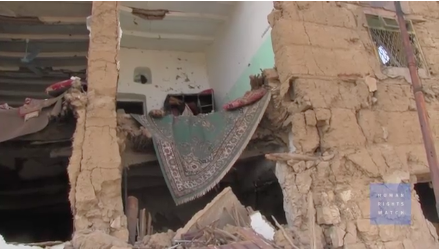At the 2015 Meeting of High Contracting Parties to the Convention on Certain Conventional Weapons (CCW), which met in Geneva from 12–13 November, states and civil society groups discussed a variety of weapons posing grave humanitarian threats. Autonomous weapons, incendiary weapons, mines other than anti-personnel mines, and the use of explosive weapons in populated areas dominated the meeting’s general debate.

Concerning explosive weapons, several delegations, including the European Union, Bulgaria, Colombia, France, Israel, Italy, Philippines, Russia, Turkey, Ukraine, and United States raised concerns with the use of improvised explosive devices (IEDs), especially by illegal armed groups or ‘terrorists’. Colombia, Iraq, and Ukraine raised these concerns in the context of their ongoing conflicts. Colombia called for concrete measures to combat this challenge, including sharing national best practices and creating victim assistance mechanisms.
While these countries called for further work on this issue, Russia warned that the CCW has a “rather limited mandate … on this issue,” and therefore while it supports further work on the issue, such work must “fully comply with the subject and objectives of the Convention.”
The use of IEDs is, of course, part of a much bigger problem. As Austria noted, it reflects the broader humanitarian challenge posed by the use of explosive weapons in populated areas. The UN Secretary-General has called on states to avoid such practices, and Austria recently brought a group of states together in Vienna to consider the development of an international political commitment to prevent humanitarian harm from the use of explosive weapons with wide area effects in populated areas.
Germany, Holy See, Ireland and New Zealand also raised concerns with the humanitarian harm caused by this problem. Germany highlighted the impacts also on civilian infrastructure, which as Austria noted is lending to the mass displacement of refugees from conflicts now. Ireland and New Zealand welcomed the Vienna meeting and looked forward to future work on this issue, with Ireland calling for “maximum compliance with IHL” and further discussions about how to reduce civilian harm. The ICRC highlighted this issue in its statement, noting the humanitarian devastation called from the practice of using explosive weapons in populated areas. Members of the International Network on Explosive Weapons present at the meeting, including Article 36 and the Women’s International League for Peace and Freedom (WILPF), called for states recognising this humanitarian problem to take action to prevent harm through the development of new policies and practices.
This summary was written and first published by INEW member Reaching Critical Will of WILPF. You can read the full article on the CCW 2015 meeting of states parties here.
